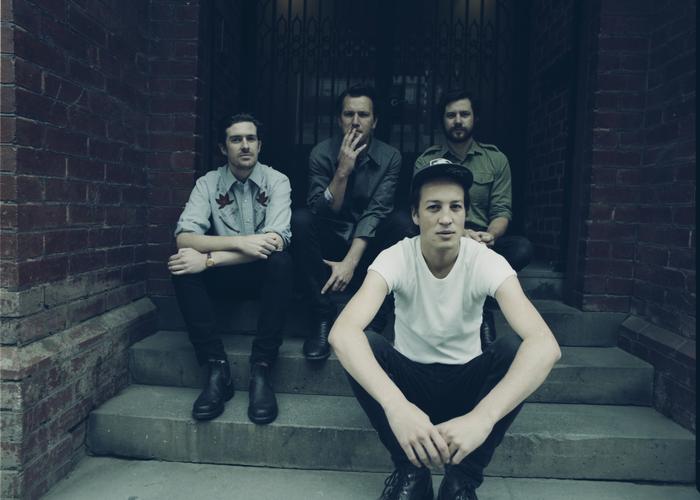“Each song is a character,” says Marlon Williams of his self-titled solo debut: a remarkably assured and diverse nine-track tapestry, united by one of the most versatile and evocative voices you’ll hear this or any other year. “I don’t really ever sing out of character. Even if it’s a very personal song, once it’s written it doesn’t belong to me.”
A veteran at the age of 24, Williams found his calling as child growing up in Lyttelton, New Zealand. A picturesque coastal town populated by fewer than 3000 people, he recalls its “wonderful contrast between port workers and a big artistic community”. The latter includes his mother and father, respectively a painter and industrial punk musician. “The first three things I remember Mum listening to were PJ Harvey, early choral music and Smokey Robinson. A lot of Maori music too. We used to go down the marae for meetings and sing these big harmony songs.”
Dad would bring home ...
Show the rest
“Each song is a character,” says Marlon Williams of his self-titled solo debut: a remarkably assured and diverse nine-track tapestry, united by one of the most versatile and evocative voices you’ll hear this or any other year. “I don’t really ever sing out of character. Even if it’s a very personal song, once it’s written it doesn’t belong to me.”
A veteran at the age of 24, Williams found his calling as child growing up in Lyttelton, New Zealand. A picturesque coastal town populated by fewer than 3000 people, he recalls its “wonderful contrast between port workers and a big artistic community”. The latter includes his mother and father, respectively a painter and industrial punk musician. “The first three things I remember Mum listening to were PJ Harvey, early choral music and Smokey Robinson. A lot of Maori music too. We used to go down the marae for meetings and sing these big harmony songs.”
Dad would bring home CDs every week, moving from Elvis and The Beatles through Echo & The Bunnymen, The Band’s Music From Big Pink, and, crucially, Gram Parsons: “A rock ’n’ roll dude playing country music, but respecting the purity of it.”
A similar duality informed the young Williams’ unique journey as a singer, combining his family’s Maori upbringing with the vocal epiphanies he discovered in the school choir and then in nearby Christchurch’s cathedral ensemble. “It’s a very different approach,” he explains. “With the Maori songs it’s layered thirds, one over the other. You just feel when you want to bring another third. But then I spent most of my teenage Sundays at church. We’d sing a 30-minute Mozart Mass where every note is prescribed. I’m not a spiritual person but the music was enough to keep me there, through whatever hangover I had.”
He even enrolled in the prestigious University of Canterbury, but classical music’s institutionalized stuffiness proved too much. The Unfaithful Ways, his band of fellow fallen choirboys, was becoming a hot local live draw. “I did a year at university, but they didn’t like that I was out playing in bars at weekends and coming in on Monday smoking. I was wearing country shirts to our performance days, instead of the bow tie and penguin suit.”
After the youthful combo folded its frontman cut a trio of domestically acclaimed duo discs with prolific Lyttelton tunesmith Delaney Davidson, then made the decision to relocate to Australia – partly pushed by the ruinous earthquakes that had left Christchurch in disarray, partly pulled by the promise of Melbourne’s bountiful music scene. Williams pitched up at legendary pub venue the Yarra Hotel, winning over seasoned booze hounds with a first gig on the eve of the Aussie rules football grand final.
Returning home to record, utilizing the The Sitting Room in Lyttelton Harbour – and working once more with producer/engineer Ben Edwards, whose prior loyalty extended to rescuing The Unfaithful Ways’ album master from a cordoned-off quake aftershock area. Such deep-rooted bonds birthed an eclectic yet cohesive set that ranges from rollicking, acrobatic opener “Hello Miss Lonesome” to the wry coffee house wisdom of “Everyone’s Got Something To Say”, via Rubber Soul-ful zinger “After All” and “Lonely Side Of Her”’s beauteous barroom empathy (penned for paramour and co-vocalist Aldous Harding).
Its author’s easygoing gender fluidity is expressed through his revelatory, androgynous reading of the traditional lament “When I Was A Young Girl”, previously hymned by Nina Simone and Feist, among others. “That’s a real fun challenge. An exposition of how songs are personal and impersonal at the same time. I don’t even think about [male or female]. Either that or I don’t think of myself as a boy anymore! The version I knew was by Barbara Dane, a white San Francisco soul/folk singer from the ’60s.”
This ability to truly inhabit his material illuminates Williams’ majestic rendering of such diverse touchstones as classic orch-pop ballad “Lost Without You” and conceptual, 1974-vintage nugget “Silent Passage” (originally by Bob Carpenter, a Canadian of First Nations heritage). These covers blend seamlessly with novelistic noir standouts “Strange Things” and “Dark Child” (co-credited to childhood choral pal Tim Moore, now a palliative care nurse), which deliver gallows humor with a widescreen groove. That quality is further illustrated by their playfully cinematic videos.
Having been nominated for 5 New Zealand Music Awards, an Australian ARIA Award and completed sold out album release tours, this Southern Hemisphere star’s eagerly awaited international release should see Marlon Williams soar.
ALBUM PRESS
“Picks his marks and hits them…captivating” Rolling Stone
“…his voice soars to the heavens and plucks at the heartstrings.” The Australian
“One of the most impressive country records this year” Tonedeaf
“At times impossibly fun, at others bone-achingly beautiful; Marlon Williams has delivered a gem” The Music
Hide the rest















